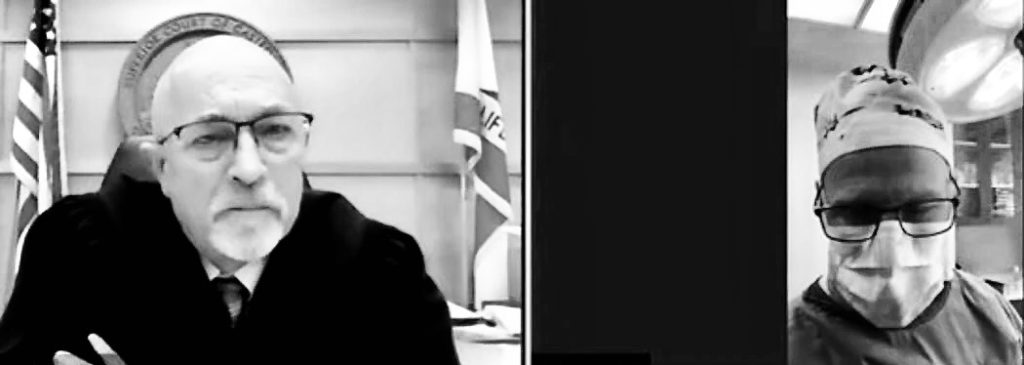
As health professionals we’ve all multitasked on Zoom calls. But few of us have done Zoom calls with a patient asleep in front of us. Recently we heard the story of a California plastic surgeon Zooming court from the operating room with a patient on the operating table.
“Hello, Mr. Green? Hi, are you available for trial?” a courtroom clerk said as Dr. Green, wearing a surgical mask and cap, appeared in a virtual square with operating room lighting fixtures visible behind him. “It kind of looks like you’re in an operating room right now.”
“I am, sir,” Dr. Green replied as machines beeped in the background. “Yes, I’m in an operating room right now. I’m available for trial. Go right ahead.”
The story of Zooming court from the operating room hit every news outlet in the free world as you can imagine.
Beyond what was this guy thinking here are a few thoughts:
Perception trumps reality
I don’t know all the circumstances around the case. But after seeing clips of the encounter it appears that the doctor was in the operative field while trying to handle his court business on Zoom. Even if there was another doctor in the operating room with primarily responsible for the welfare of the patient, the optics just aren’t good. It’s important to remember that perception almost always trumps reality.
Multitasking is an illusion
Zoom gave this doctor the false belief that he could be in court while performing surgery. We’ve all fallen prey to the narcissistic illusion that we can do all kinds of stuff at once. And we can. But it’s usually in a half-assed way.
So how many things can we do at once? Not many. From this New England Journal of Medicine Perspective piece in January of this year it seems our most important resource in medicine is attention:
Evidence from cognitive science is clear: fractured attention leads to increased processing time spent on complex tasks, impaired working memory, and bias. In medicine, distraction contributes to lapses in judgment, insensitivity to changing clinical conditions, and medication errors.
James Clear (author of Atomic Habits) has suggested that
multitasking forces you to pay a mental price each time you interrupt one task and jump to another. In psychology terms, this mental price is called the switching cost. Switching cost is the disruption in performance that we experience when we switch our attention from one task to another.
So as a patient the last thing any patient needs to be thinking about is the switching cost paid by the doctor caring for them.
Technology will continue to impose demands on our attention
Those looking to make the tools that suck our attention sell us on the idea that we can be in two or more places at once – like in court while in the OR. Going forward options for connection and information input from beyond our IRL space will continue to grow. And if we don’t check ourselves we’ll to fall into the belief that our bandwidth can scale to meet what Silicon Valley delivers.
What happened here is more of a human problem than a tech problem. A videoconferencing application doesn’t know better. But we do. And knowing where, when and how to let tools between us and our patients and understanding how could help or hinder us will be a big part of our job going forward.
We need to be intentional with our presence
Management thinker Esko Kilpi suggested (on Twitter June 12, 2019) that
The future of human work is based on being more intensively present. The management challenge is to create work environments that functionally support people being more intensively present.
He wasn’t referring to medicine but our profession should be the index case for intensive presence.
We have to be intentional with our presence. One of my favorite people on the planet is Craig Mod who in this 2017 Wired essay suggests that attention is like a muscle. It must be exercised:
Though, attention is duplicitous — it doesn’t feel like a muscle. And exercising it doesn’t result in an appreciably healthier looking body. But it does result in a sense of grounding, feeling rational, control of your emotions — a healthy mind. Our measuring sticks for life tend to be optimized for material things, things easy to count. Houses, cars, husbands, babies, dollar bills. Attention is immaterial, difficult to track.
Among humans our presence is our superpower. In fact, as technology grows in and around us presence may be one of the few things remaining that truly defines us and our clinical relationships.
We shouldn’t squander it. We should exercise the muscle and the power. Even when the the person we are focused on is asleep.